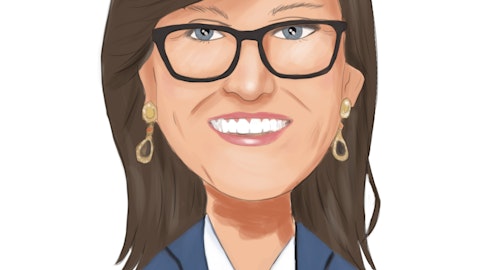Joseph DeVivo: As far as — when I look at our chip technology, again, we are the first company in the world to create a semiconductor wafer with a MEMS technology to deliver SEP. There’s — the Butterfly investors have invested a significant amount of capital in creating this technology. And this technology has the most sophisticated supply chain and the best chip manufacturer in the world behind it. And when I look at the cost to develop this technology and I look at the use of the technology. So we are using the technology specifically to translate sound for imaging inside the body for practice. The desire and need to be able to take this imaging capability exists across health care. And it exists in endoscopic surgery. It exists in implantables.
And instead of — in areas where we don’t have distribution channels, we are willing to partner with people who can leverage the technology for their benefit and in turn, benefiting the Butterfly investors. So we’ve ring-fenced the markets that we believe that we will be in individually. And we’ve allowed ourselves to talk — we’ve allowed ourselves to talk with partners who we believe in a marketing perspective are non-competitive, but will benefit because the chip is very small and the chip can be embedded, it’s the size of a finger that if they wish to image and see and do things for different applications, I’m coming into this company looking at the investment that investors have made and now want to leverage that investment. And I want to find ways to create and increase the breadth of it because it’s an incredible discovery by our founder, Dr. Roberge.
And it probably deserves to be in society beyond the marketing channels that we have. Now I’ll turn it over to Heather, but we don’t specifically talk about a number of territories, but Heather can maybe answer the second part of the question.
Heather Getz: Suraj, the way I would think about it is that in is expenses within R&D. But within sales and marketing, we’ve reallocated them. So we had some indirect spend within sales and marketing that we’re now reallocating to direct sales people. The sales and marketing number may go down a little bit, but it will be restored as we add additional sales reps to that. And obviously, we believe that, that will help accelerate our top line revenue number.
Joseph DeVivo: Yes. Suraj, if you look at from August of last year to this year, Butterfly management has taken out $170 million of cost of run rate cost. And when you do that, it’s sometimes not perfect. And I believe in the beginning of ’23, there were some sales and marketing costs that were taken out that impacted our momentum. It’s indisputable. And so we’ve needed to recover that spend and then also come up with a very focused strategy. Ultrasound is complex in that it can be used there everywhere. I can go through every clinical specialty, MSK, women’s health, cardiac, pulmonary, any type of liver or gall bladder. And you can’t fund the study in every organ. You can’t say you do everything because when you do everything you do nothing even though you can.
And so we focused on investments where we know we can win or we know we’re better than the competition in use cases. And we’re going to drive a truck to it. And then, of course, all the other applications are going to get pulled along with it. But in being in robotic surgery, early late ’90s there was one focus on robotic surgery, and that was on urology. Could the robot be used everywhere? Yes. But it was until there was a 5-year prospective randomized trial in prostate that showed that all of a sudden tip the scales and then everything went. If that wasn’t done at that time, they didn’t focus on that one use case, then that adoption wouldn’t have occurred. And so there’s — I mentioned on my last call, how excited I was to join the team because when I see everything that R&D has worked on and I see all the things that they’ve created, there’s so much now to bring to market.
It’s just the focus was necessary.
Suraj Kalia: Thank you.
Operator: The next question comes from Neil Chatterji from B. Riley.
Neil Chatterji: Maybe just on the new guidance. Could you just maybe just elaborate on kind of the large initial international deals and kind of other onetime orders from ’22 and how pursuing those types of deals might be different in the back half and beyond? And then secondly, could you just maybe talk about the dynamic of next year versus ways to maybe incentivize and to continue to purchase IQ Plus and make it easy to upgrade.




